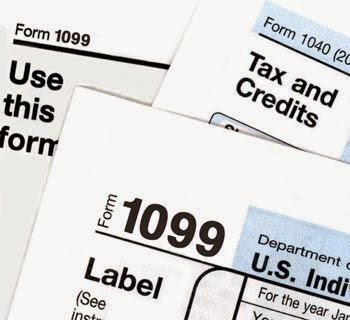
I strongly encourage our business clients, nonprofit organizations and landlords to issue 1099 forms which are required by law. The reason is IRS Form 1099 provides the means of reporting very specific types of income from non-employment related sources that might not be reported elsewhere. If you paid someone for services (other than employees) you must issue them a 1099 by January 31 of the following year. Business income tax returns including IRS Forms 1120S and 1040, Schedule C include a question asking if Forms 1099 were filed as required and by signing your return, you are certifying that your response is true.
I recommend to all my clients to review all disbursements made from January 1, through December 31, summarizing all payments for services to unincorporated individuals and businesses where the accumulated total is $600 or more. If you pay a Limited Liability Company (LLC) that is taxed like a corporation you still have to issue a 1099 to that LLC. Make sure you have the correct name, employer identification or social security number and address of everyone you pay before you pay them.
Beyond having to possibly face an IRS or State audit, if you fail to file the correct information by the deadline, fail to include all the required information on a return, or if you include incorrect information, you can be subjected to an array of steep penalties if you cannot show reasonable cause. If the payee fails to furnish his or her taxpayer identification number (TIN), they are subject to backup withholding at a 28% rate. If you do not collect and pay backup withholding from affected payees as required, you may become liable for any uncollected amount.
Here are a few additional tips of when you do not have to issue 1099’s:
1. Do not send a 1099-MISC to an employee since that is what a W-2 is for. Remember that someone that performs services for you is either an employee or an independent contractor, but not both.
2. Do not send a 1099 to someone you’ve paid by credit card, debit card or by services like PayPal. Such payments will be reported on a 1099K that they will receive from their merchant services provider
3. Do not use Form 1099-MISC to report employee business expense reimbursements. Report payments made to employees under a non-accountable plan as wages on Form W-2.
4. If you pay a non-U.S. citizen who works remotely via the Internet from another country, you do not need to file a 1099 for that person. However, if the foreign worker performs any work inside the United States, you would need to file the 1099. For that purpose, you should have that foreign worker fill out, sign and return to you Form W-8BEN.
5. Do not issue 1099’s to corporations.
If you need help issuing 1099’s or have any questions, please contact Gregory J. Spadea at 610- 521-0604. The Law Offices of Spadea & Associates, LLC prepares tax returns year round.







